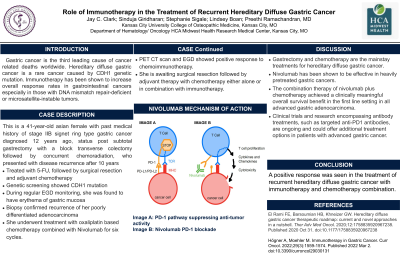Back


Poster Session A - Sunday Afternoon
Category: Stomach
A0702 - Role of Immunotherapy in the Treatment of Recurrent Hereditary Diffuse Gastric Cancer
Sunday, October 23, 2022
5:00 PM – 7:00 PM ET
Location: Crown Ballroom

Has Audio
- CC
Christian Clark, BS
Kansas City University
Kansas City, MO
Presenting Author(s)
Christian Clark, BS1, Sindhuja Giridharan, MBBS2, Stephanie Sigale, MPH1, Lindsey Boan, RN3, Preethi Ramachandran, MBBS, MD2
1Kansas City University, Kansas City, MO; 2HCA, Kansas City, MO; 3HCA, Belton, MO
Introduction: Gastric cancer is the third leading cause of cancer related deaths worldwide. Majority of cases are sporadic although 10% demonstrate familial clustering, of which 1-3% arise from inherited cancer syndromes. Hereditary diffuse gastric cancer is a rare cancer caused by CDH1 genetic mutation, inherited in an autosomal dominant fashion. Immunotherapy has been shown to increase overall response rates in gastrointestinal cancers especially in those subgroups with DNA mismatch repair-deficient or microsatellite-instable tumors.
We herein, present a case of recurrent hereditary diffuse gastric cancer with good response to chemoimmunotherapy.
Case Description/Methods: This is a 41-year-old asian female with past medical history of stage IIB signet ring type gastric cancer diagnosed 12 years ago, status post subtotal gastrectomy with a block transverse colectomy followed by concurrent chemoradiation, who presented with disease recurrence after 10 years, when she was treated with neoadjuvant 5-fluorouracil based chemotherapy followed by surgical resection and adjuvant chemotherapy. Her genetic screening showed CDH1 mutation, with high risk for breast and gastric cancers. She was monitored closely with regular breast magnetic resonance imaging (MRI) and esophagogastroduodenoscopy (EGD). During one of her regular endoscopy assessments recently, she was found to have erythema of her gastric mucosa which upon biopsy confirmed recurrence of her poorly differentiated adenocarcinoma, diffuse type with signet ring features. She underwent treatment with oxaliplatin based chemotherapy combined with Nivolumab for six cycles. She responded well to chemoimmunotherapy as evidenced by positron emission tomography and computed tomography (PET CT) scan and esophagogastroduodenoscopy (EGD). She is awaiting surgical resection followed by adjuvant therapy with chemotherapy either alone or in combination with immunotherapy.
Discussion: Gastrectomy and chemotherapy are the mainstay treatments for hereditary diffuse gastric cancer. Nivolumab has been shown to be effective in heavily pretreated gastric cancers. The combination therapy of nivolumab plus chemotherapy achieved a clinically meaningful overall survival benefit in the first line setting in all advanced gastric adenocarcinoma. Clinical trials and research encompassing antibody treatments, such as targeted anti-PD1 antibodies, are ongoing and could offer additional treatment options in patients with advanced gastric cancer.
Disclosures:
Christian Clark, BS1, Sindhuja Giridharan, MBBS2, Stephanie Sigale, MPH1, Lindsey Boan, RN3, Preethi Ramachandran, MBBS, MD2. A0702 - Role of Immunotherapy in the Treatment of Recurrent Hereditary Diffuse Gastric Cancer, ACG 2022 Annual Scientific Meeting Abstracts. Charlotte, NC: American College of Gastroenterology.
1Kansas City University, Kansas City, MO; 2HCA, Kansas City, MO; 3HCA, Belton, MO
Introduction: Gastric cancer is the third leading cause of cancer related deaths worldwide. Majority of cases are sporadic although 10% demonstrate familial clustering, of which 1-3% arise from inherited cancer syndromes. Hereditary diffuse gastric cancer is a rare cancer caused by CDH1 genetic mutation, inherited in an autosomal dominant fashion. Immunotherapy has been shown to increase overall response rates in gastrointestinal cancers especially in those subgroups with DNA mismatch repair-deficient or microsatellite-instable tumors.
We herein, present a case of recurrent hereditary diffuse gastric cancer with good response to chemoimmunotherapy.
Case Description/Methods: This is a 41-year-old asian female with past medical history of stage IIB signet ring type gastric cancer diagnosed 12 years ago, status post subtotal gastrectomy with a block transverse colectomy followed by concurrent chemoradiation, who presented with disease recurrence after 10 years, when she was treated with neoadjuvant 5-fluorouracil based chemotherapy followed by surgical resection and adjuvant chemotherapy. Her genetic screening showed CDH1 mutation, with high risk for breast and gastric cancers. She was monitored closely with regular breast magnetic resonance imaging (MRI) and esophagogastroduodenoscopy (EGD). During one of her regular endoscopy assessments recently, she was found to have erythema of her gastric mucosa which upon biopsy confirmed recurrence of her poorly differentiated adenocarcinoma, diffuse type with signet ring features. She underwent treatment with oxaliplatin based chemotherapy combined with Nivolumab for six cycles. She responded well to chemoimmunotherapy as evidenced by positron emission tomography and computed tomography (PET CT) scan and esophagogastroduodenoscopy (EGD). She is awaiting surgical resection followed by adjuvant therapy with chemotherapy either alone or in combination with immunotherapy.
Discussion: Gastrectomy and chemotherapy are the mainstay treatments for hereditary diffuse gastric cancer. Nivolumab has been shown to be effective in heavily pretreated gastric cancers. The combination therapy of nivolumab plus chemotherapy achieved a clinically meaningful overall survival benefit in the first line setting in all advanced gastric adenocarcinoma. Clinical trials and research encompassing antibody treatments, such as targeted anti-PD1 antibodies, are ongoing and could offer additional treatment options in patients with advanced gastric cancer.
Disclosures:
Christian Clark indicated no relevant financial relationships.
Sindhuja Giridharan indicated no relevant financial relationships.
Stephanie Sigale indicated no relevant financial relationships.
Lindsey Boan indicated no relevant financial relationships.
Preethi Ramachandran indicated no relevant financial relationships.
Christian Clark, BS1, Sindhuja Giridharan, MBBS2, Stephanie Sigale, MPH1, Lindsey Boan, RN3, Preethi Ramachandran, MBBS, MD2. A0702 - Role of Immunotherapy in the Treatment of Recurrent Hereditary Diffuse Gastric Cancer, ACG 2022 Annual Scientific Meeting Abstracts. Charlotte, NC: American College of Gastroenterology.
